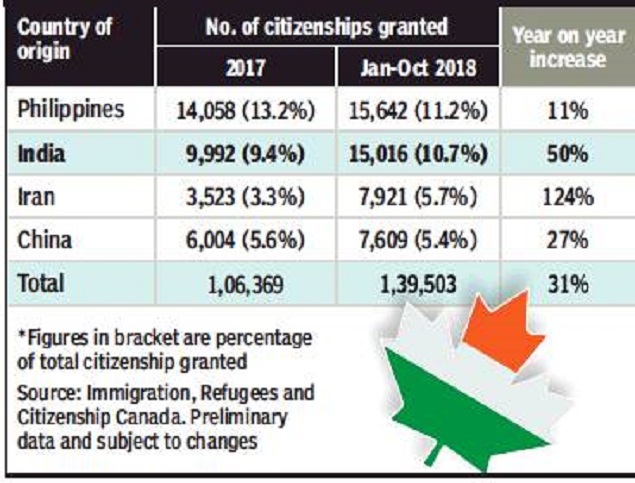50% Rise in Canadian Citizenship for Indians This Year
- Home
- Canada Permanent Resident (PR) Processing Rules
- 50% Rise in Canadian Citizenship for Indians This Year
50% Rise in Canadian Citizenship for Indians This Year
MUMBAI: Indians residing in Canada are taking their immigration journey a step forward, with several thousands opting for Canadian citizenship, after having lived in the country for the specified duration as permanent residents.
Responding to a request from TOI, Canadian authorities shared some statistics. During the 10-month period ending October 2018, nearly 15,000-odd Indians obtained citizenship. If compared with 2017, it’s a steep rise of 50%.
As country of birth, India figured in the second highest number of applications from those claiming Canadian citizenship. Philippines topped this list by a slender lead: 15,600-odd Filipinos became citizens of Canada during this ten-month period, but this was a marginal increase of 11% compared to the traffic from Philippines for the entire 12 months of 2017.

In all, according to statistics shared with TOI, 1.39 lakh permanent residents became Canadian citizens in the 10 months ended October 30; of this, the share of Indians was nearly 11%. These are preliminary figures and final statistics are estimated to be much higher. But it is still unlikely to cross the record high of 2015 when the highest number of Indians—28,000-odd—opted for Canadian citizenship, following which there was a year-on-year decline, with interest picking up again sharply in 2018.
“Since Oct 2017, it has become easier to qualify to apply for Canadian citizenship. In particular, the time period for which a permanent resident must be physically present in Canada before applying for citizenship has reduced. As compared to a 4-year residency requirement out of 6 years, now a permanent resident needs to be physically present in Canada for 3 out of five years,” explains Ontario-based Talha Mohani, immigration law specialist and managing director at Migration Bureau Corp.
Unlike a permanent residency (which is akin to a green card in the US), a citizenship grants more benefits, such as greater mobility, eligibility to work in the government sector, and obtaining the right to vote.
David Nachman, managing attorney at NPZ Law Group, points out an important facet of mobility, “A Canadian passport (citizenship) also facilitates individuals to apply for a Trade National (TN) visa to enter and work in the US.” While this is similar to the H-1B work visa it is not subject to the annual cap and is easier to obtain.
Incidentally, India has emerged as the top source country for permanent residents. During 2017, 51,000-odd Indians were admitted as permanent residents. These statistics were tabled in the annual report (2018) on immigration submitted to the Canadian Parliament (see box).
According to the Immigration, Refugees and Citizenship Canada (IRCC), the federal department which facilitates arrival of immigrants to Canada, an estimated 1.53 lakh people would have obtained Canadian citizenship by October 2018—being a year from the date the new relaxed norms for citizenship came into effect. This estimate is an increase of 40% compared to the 1.08 lakh people who obtained citizenship in the same period the year before, adds the IRCC in an official release.
IRCC adds that after the changes in the regulation, during the nine-month period from October 2017 to June 2018, it received 2.42 lakh applications for citizenship, more than double the previous corresponding period. Despite this, the processing time continued to be within 12 months.
There are also many individuals who have not yet obtained Canadian citizenship, who commute daily from Canada to US for work. Hari (last name withheld) has a Canadian Permanent Residency, and currently works in the US on an H-1B visa. He moved from US, a little over two years ago, to enable his wife to obtain a job.
Hari describes his daily commute between Windsor area in Canada and the US border town of Detroit as easy. “The H-1B visa is a non-immigrant visa, and my daily commute is not regarded as my having abandoned permanent residence in Canada. I will however, have to prove that I returned to Canada each day and cross-border tax implications have to be dealt with.” Long term, he plans to obtain Canadian citizenship and work in Canada as the tech sector there is expanding.
Indians top charts for PR status
India with 51,651 Indians (or 18% of the total) admitted as permanent residents (PR) during 2017, emerged as the top most source country. This was a rise of 30% over the previous year. It toppled Philippines, with 40,857 Filipinos getting entry into Canada as permanent residents, followed by the Chinese with 30,270. In all 2.86 lakh individuals were admitted into Canada as permanent residents. These statistics are detailed in the ‘2018 Annual Report to Parliament on Immigration’. The Canada Immigration Levels Plan for 2019 to 2021 reveals that more than a million new immigrants will be admitted over three years.
The trend is likely to continue given the growth of the tech sector in Canada and protectionist regime of the Trump administration. TOI had, in its front page of June 15, pointed out the trend of H-1B workers, migrating to Canada.
News Source: https://timesofindia.indiatimes.com/india/50-rise-in-canadian-citizenship-for-indians-this-year/articleshow/67248609.cms?utm_source=facebook.com&utm_medium=social&utm_campaign=TOI&utm_content=om-bm&from=mdr



2 comments
Interested in PR of Canada
Hi Aman,
Thank you for visiting Macropus Digital News Portal. Please submit Canada Immigration Assessment and we will get back to you with available options based on your profile.
Hyperlink to Canada Immigration Assessment: https://www.macropusimmigration.com/canadian-immigration-assessment/